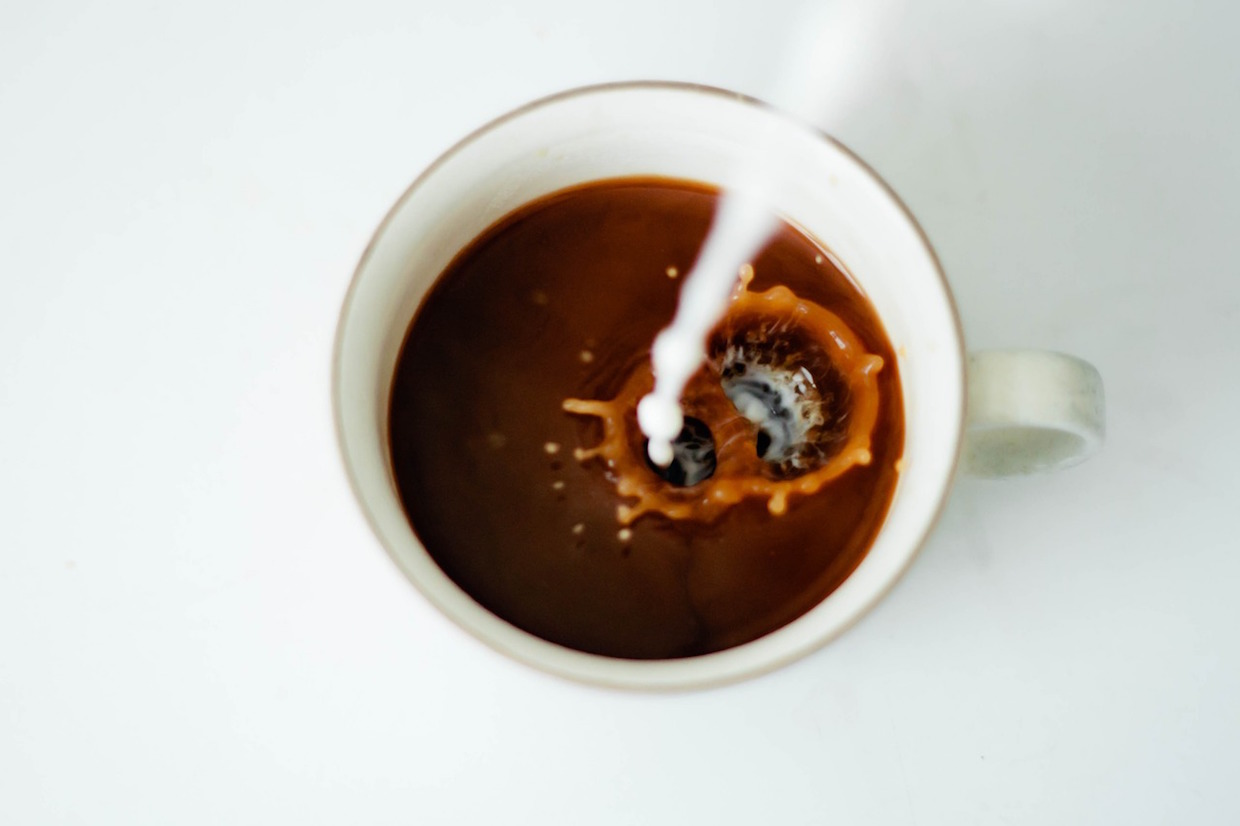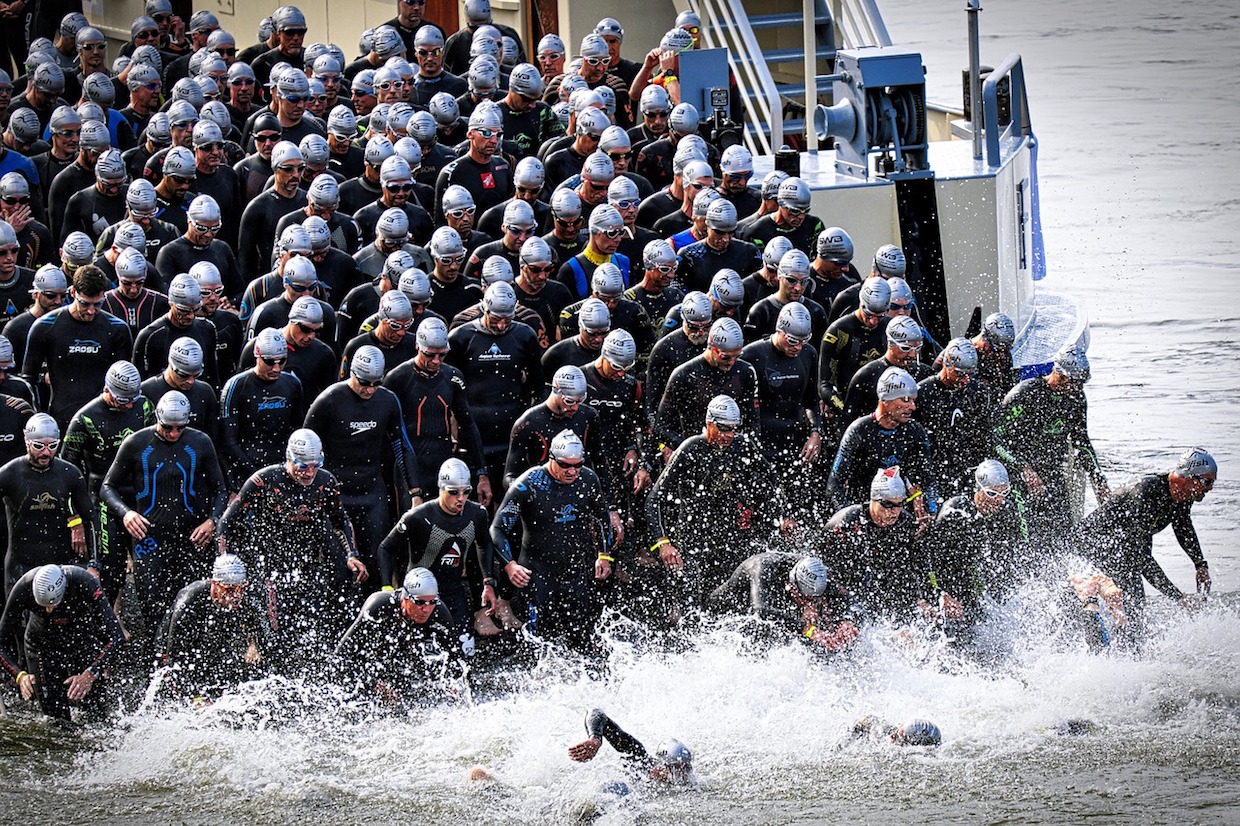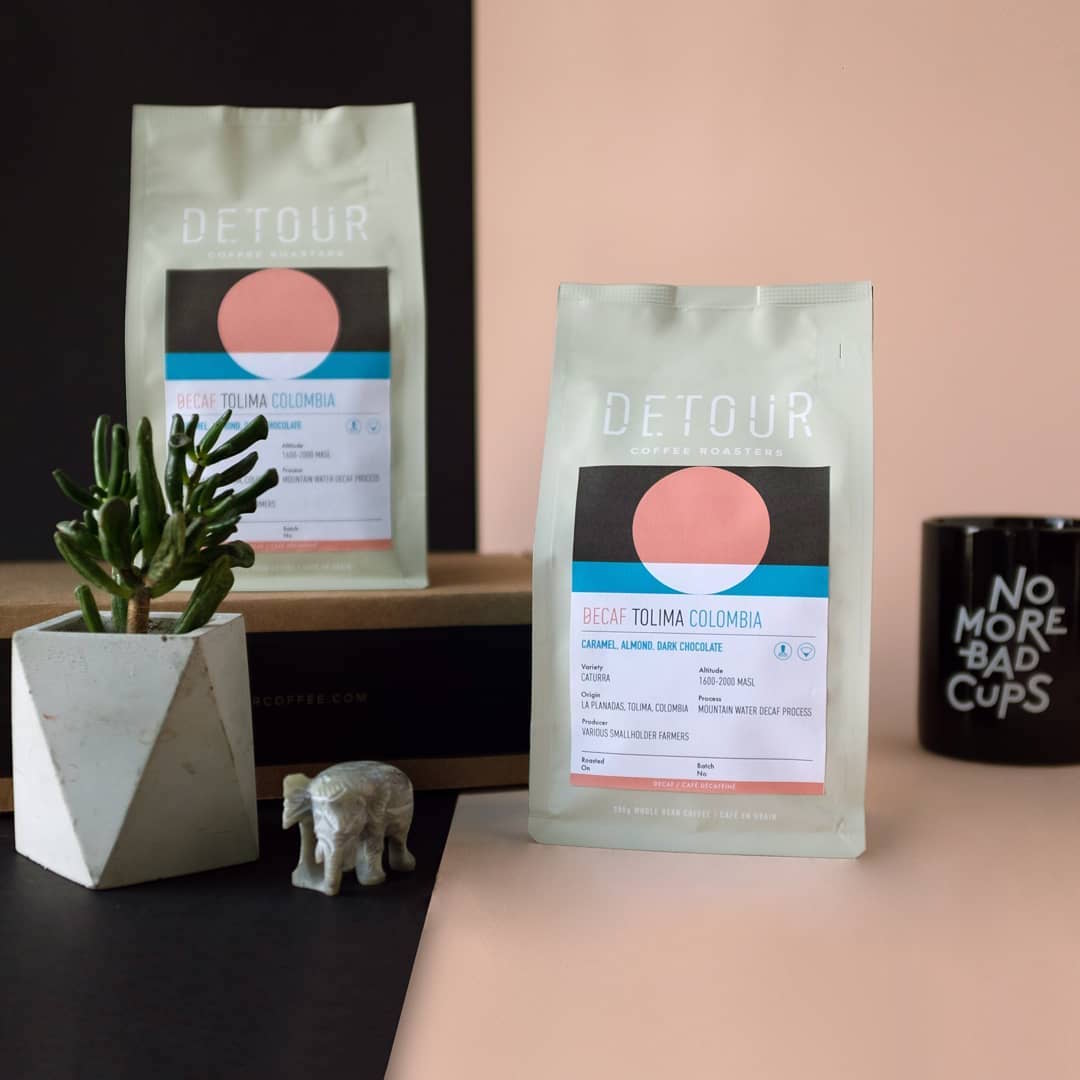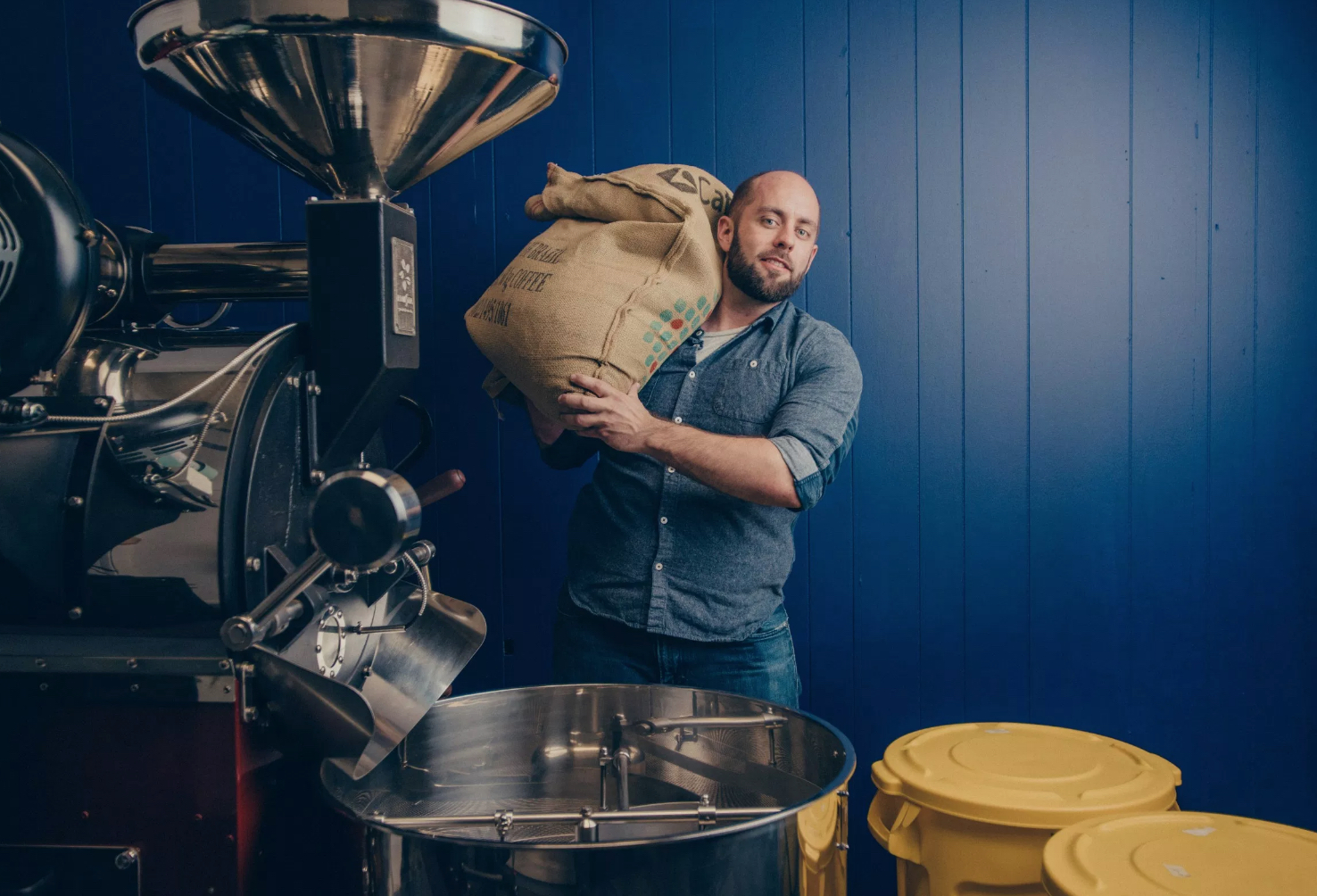Forbes chatted with Blue Bottle Coffee Founder James Freeman this week about the coffee company’s “expensive experiment” in canning its whole beans for retail. Freeman spoke of the challenge in balancing priorities between effective preservation and compostability vs. recyclability:
For years, Blue Bottle Coffee, much like other third-wave roasters, has been using PLA packaging. PLA, a polymer made out of corn, is compostable. “But then you’re supporting corn, and that’s a questionable crop and industry as well,” Freeman points out.
If that’s a serious concern of his, Freeman might further experiment with serving strictly non-dairy Gibraltars, given that more than a third of corn produced in the United States goes to livestock feed. The switch would apparently not be bad for business either. Beverage Daily picked up on recent research by Datassential indicating that among the two-thirds of consumers who opt for creamers at home or in cafes, lots are thinking vegan:
Within those categories, Datassential found that 83% of people are at least interested in using plant-based creamers or ‘milks’ in their coffee. About 34% of people use them often, 33% use them sometimes, 16% have never used them but are open to trying and 17% are not interested.
But it’s not enough to look at a plant-based blanket, as different types of creamers rule over others. Basics like almond, soy and coconut are still holding strong but are facing competition from emerging flavors like oat, flaxseed, quinoa, hemp and chia seed, particularly among female Gen Z and millennials.
A project is underway in Uganda to convince land-owning parents to gift relatively small portions of land — less than an acre — to their children. The goal is to pass coffee farming on through the generations while also reducing rural unemployment. All Africa had more:
Half an acre of land would allow an unemployed person to make a living from coffee, said Joshua Rukundo, who heads the Kigezi Coffee Development Academy, a locally-based community group. That would bring fundamental changes.
“Even if it is half an acre and you give it to your child to grow coffee now, in a period of three years it is a done deal of harvesting coffee,” Rukundo said.
According to the Uganda Coffee Development Authority (UCDA), a single acre can host 450 Robusta coffee trees or 600 Arabica trees. Each tree can yield 10 kilogrammes of coffee a year, with each kilogramme worth about 4,000 Ugandan shillings ($1).
One acre, then, can generate average monthly revenues of up to $500, a large sum in Uganda where the employed earn an average 416,000 shillings ($110) a month, according to the Uganda Bureau of Statistics’ national household survey of 2013.
Uganda Prime Minister Dr. Ruhakana Rugunda also has high hopes for coffee production as both a valuable export and a tourist attraction. At a one-day symposium called “Unlocking Uganda’s Coffee and Tourism Potential,” Rugunda pledged continued government support for high-quality coffee production amid other calls for the sectors to work together, according to SoftPower:
On his part, the State Minister for Agriculture, Christopher Kibanzanga emphasized the critical role coffee farmers must play in the push to propel the sub-sector to the desired growth.
“This is an indicator of more money and tourists coming into the country to embrace both Ugandan attractions and coffee. To the farmers, this implies the demand will shoot up and this will come with demand for improved skills in their production line,” Minister Kibanzanga said.
Coffee-guzzling cyclists got good news this week from Triathlon Magazine, which found that research recently published in the Journal of Applied Physiology indicates that caffeine right before activity does still gives an immediate performance boost, no matter how regularly one consumes the stuff:
The study included 40 male cyclists, all of whom either compete at an amateur or professional level. Cyclists did a baseline (control) 30-minute time trial based on their caffeine intake (low, medium or high). Two other time trials were done, one with placebo (dextrose) and the other with caffeine (anhydrous caffeine: 6 mg/kg) supplementation.
The study discovered that caffeine supplementation did improve exercise performance by 3.3 per cent compared with control and 2.4 per cent compared with placebo. However, no link between habitual caffeine intake and exercise improvements with caffeine supplementation were found, suggesting you will not become conditioned to the positive performance benefits of caffeine on endurance.
Felix Thea’s weekly podcast Shopify Masters honed in on Detour Coffee Roasters for details on how the 10-year-old Canadian Company’s new owner Alex Yurek approached the risky challenge of re-branding. It’s like a thorough case study, exploring everything from the acquisition process to email marketing, as well as the various steps of overhauling the entire brand:
Felix: You mentioned that you guys made changes to the brand over time, starting with the website and then moved on to the packaging and then moved on to the product offering. Why did you choose to approach in making the changes in that order?
Alex: Really what that allowed us to do was it allowed us to test our hypotheses in ways that were progressively more expensive. So by us doing some light web redesign and relaunching and seeing the traction and what people thought is kind of being some initial design hypotheses. It allowed us to really test where we were wrong, to be honest, and we had a lot of lessons learned from that. And I’d rather have that lessons learned with a little bit of design time and a little bit of design effort before we actually go and …
To give you a sense of what the purchase order would look like for buying new packaging is when we buy bags for our coffee, we need to buy them 100,000 bags at a time. So I’d much rather make mistakes with web design that we can easily edit, change, and shift and lift around than make those changes and have to live with 100,000 bags for a certain period of time.
Other lessons in entrepreneurship are soon to come from Parengo Coffee founder Colby Williams’ self-published book, “Small Town Big Money,” due out next month. The Southeast Missourian caught up with the author to learn more about the project:
And while he draws several examples from his own experience starting up Parengo Coffee, he said, anyone selling a product or service can glean helpful advice from the book.
“I tried to offer enough stories of Parengo and my own experience — mostly failures,” Williams said, laughing. “I think that’s more entertaining. Who am I? I’m relatively young and this is my first business venture. What I do have are stories.”
The Chicago Tribune examined how social norms around tipping have shifted with the suggestive ease of digital checkout systems, although some systems apparently make tipping so overtly easy that it becomes, well, uneasy, according to Dollop Coffee barista Evelyn Rangel:
Rangel, 28, has seen customers freeze at this juncture in the payment process, unsure whether to tip for counter service.
“Sometimes I’ll notice someone is hesitating and I’ll find something else to do for a couple of seconds and walk away,” said Rangel, insisting that she was not miffed when the buyer of the almond croissant selected the “no tip” option. “Customers are way more worried about it than we are.”
Evidently some Starbucks customers are far less concerned about what other people see happening on the screens in front of them. And yet, after Starbucks followed through with a longstanding promise to block porn sites from coming through its public wifi signals, the popular porn website YouPorn struck back by banning its workers from bringing Starbucks coffee into its offices. Forbes got the scoop:
In a memo sent to employees by YouPorn by Vice President Charlie Hughes, effective on January 1st, Starbucks products will be banned in the Youporn offices. I can’t imagine there will be someone walking around the office, slapping lattes out of people’s hands. This is clearly being sent as a bit of a lolz from the executive team over at YouPorn.
Howard Bryman
Howard Bryman is the associate editor of Daily Coffee News by Roast Magazine. He is based in Portland, Oregon.












Comment